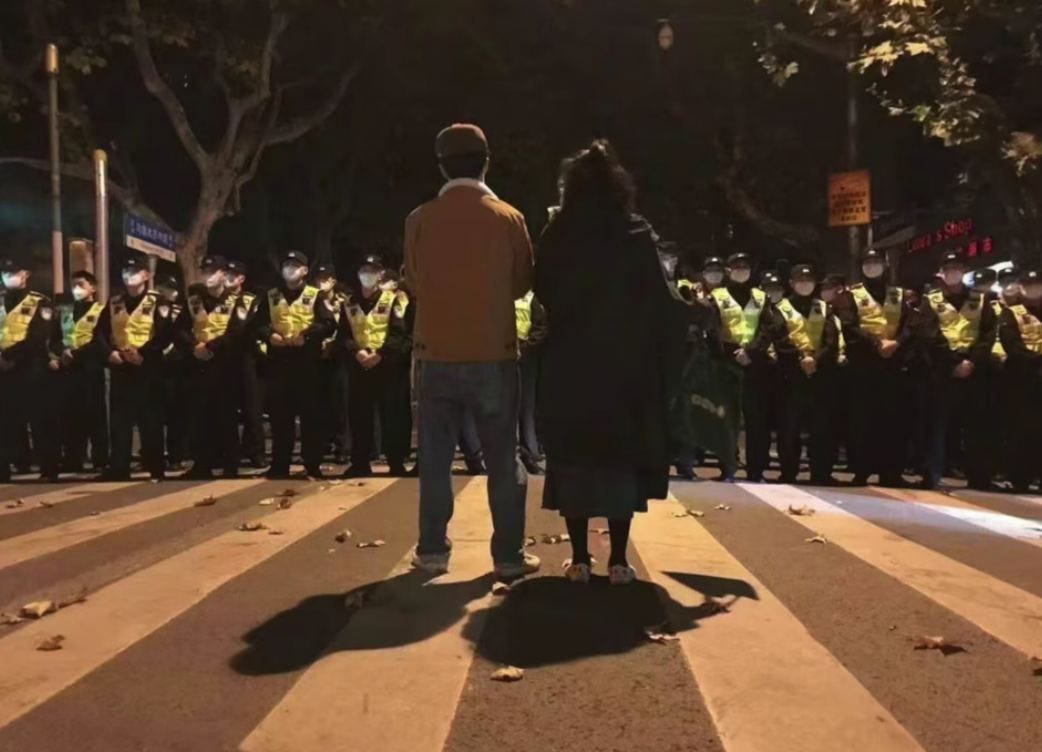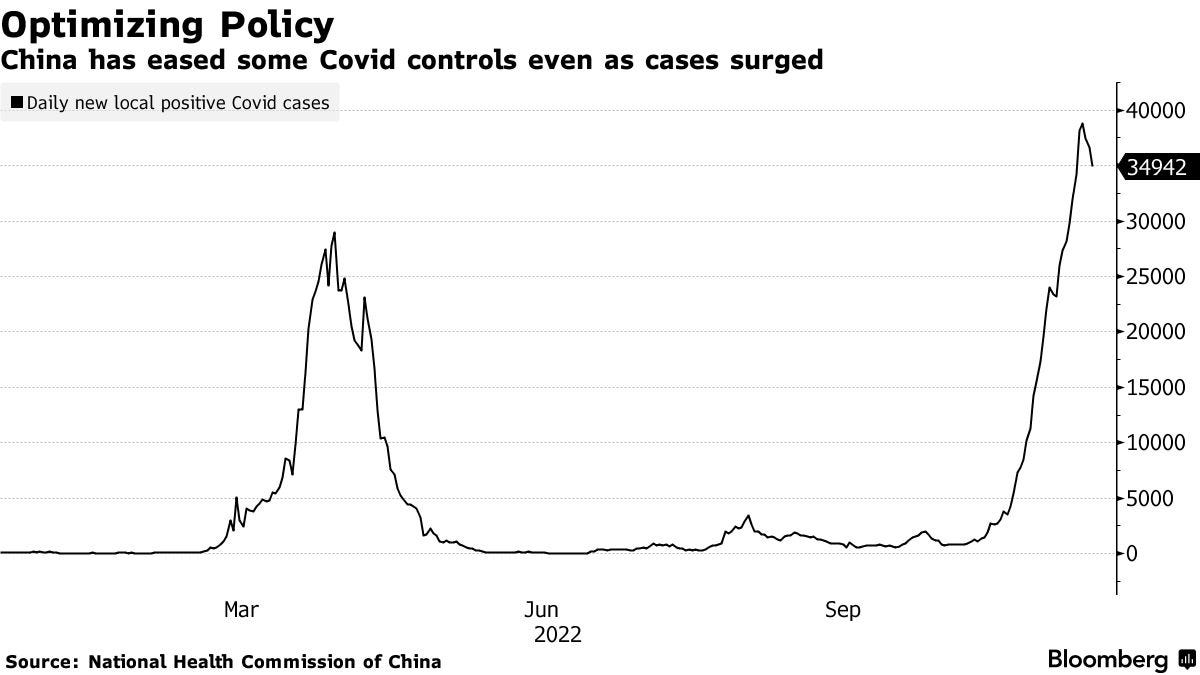Beijing hoists the flag of surrender
Central government weakness is the big unreported story
View from China with an Austrian School of Economics Perspective
Ayn Rand has once again triumphed1. Beijing chose to ignore the hopelessness of its campaign against nature, but could not ignore the consequences of that campaign.
At noon on November 30th, despite stubbornly high case numbers, Guangzhou restaurants suddenly received notification that effective December 1st, restaurants were henceforth permitted to allow in-house dining. In-house dining had been banned for over a month.
Yet there were still long queues of people snaking around PCR testing booths, some up to 200 meters. At 4 pm, suddenly testing booth workers emerged and announced via loudspeaker that they had just received notification that the testing booths were going to be closed effective immediately.
“解封了,解封了” (Freed, freed!)
Up to date test results were no longer required to gain entrance to restaurants, subways and office buildings.
Bit by bit, reports of policy changes in many other cities followed. For example, Beijing also closed a number of PCR testing booths and abandoned the 48-hour test result rule for using the subway, but left in place the 48-hour rule for those entering office buildings. What sense does that make? Result: Huge lines at the remaining booths.
Several cities have announced ‘pilot projects’ to allow some infected people to quarantine at home. Of course if tests are no longer required for everyday life, then most will stop testing and the whole quarantine topic will become increasingly irrelevant.
While three years of off and on chaos are not quite over yet, clearly something major has changed.
So what happened?
What happened was a press release issued by the National Health Commission. It was a press release about a symposium being held the same day. It was not an official policy, but the phrase “zero-Covid” was missing.
*****
We’ll come back to this press release in a bit, but first let’s take a look at what led up to it.
As mentioned in our previous article, Western reporting on the recent events has not always been very accurate. So what really did happen in Xinjiang? And why?
The unreported story is that what happened there, and what happened in many other places all around China, was that the central government was losing control.
Local government obedience to central government mandates has always been sporadic at best. This pattern is however most glaring when they are being asked to carry out unrealistic policies.
With respect to Covid, local governments have often implemented crazy policies which are far 'stricter' than what the central government allows. This tendency has been particularly glaring after the release of the central government’s 20 ‘optimization’ rules on November 11th.
Other local governments have gone the other direction, namely by choosing to defy the central government and attempting to allow people to return to getting things done.
‘Local government’ could mean a city government, a county government, or even a district or town.
The housing complex where the Ürümqi fire took place had been locked down for over 100 days, and was still under lockdown in violation of the first of the 20 rules.
Three children from one family died, not because they were locked inside their apartment, but because their parents were not there to take care of them. The parents were stuck outside of Ürümqi and due to entry/exit restrictions apparently could not return to take care of their children.
Finally, fire engines could not get close to the building because the road was blocked by cars with dead batteries which could not be moved.
Shortly after the release of the “20 optimizations”, the city government in Shijiazhuang, the capital of Hebei province, announced an end to all testing and quarantines. Five days later it was rebuked and had to revert back to the previous set of policies.
In Beijing, some housing complexes were under general lockdown as recently as a week ago, all in violation of the 20 rules, which only permit the lockdown of apartments sharing an entrance with a case.
What led to the lockdowns being rescinded? Complaining. Calls to the government complaint hotline 12345. And badgering the local neighborhood committees.
Meanwhile in Shanghai, which until recently still had almost no cases at all, the government instituted its own set of super strict rules aimed at limiting incoming cases. Everyone arriving from other provinces is banned from public areas such as restaurants and supermarkets for 5 days, an idea which is obviously a huge problem for lots of people – for example people who commute over provincial borders. There has even been talk of some kind of ‘travel bubble’ arrangement with neighboring provinces.
One of the ideas behind the “20 optimizations” was to replace this massive patchwork of policies all across China with a unified set of policies that everyone could orient their planning around.
That failed completely.
So what was left was to complain and protest. Millions of 12345 cases were opened online or by telephone. And public protests took place in many cities across China, mostly memorably in Beijing at Liangma Qiao, on Shanghai’s Ürümqi Road, and in Wuhan. Some carried banners with specific demands, but most carried blank sheets of paper as a silent protest mocking China’s absurd zero-speech policy.
Some of the chants:
不要核算,要自由 – We want freedom, not PCR tests!
不要做人民,要做自己 – We’re not just part of the ‘people’; we are individuals.
Many of these chants echoed the banners hung on Beijing’s Sitong Overpass back on October 13th. They had not been forgotten. For those who missed that, we documented that event here:
Probably rather unwisely, some of the protesters in Shanghai even called for the overthrow of the government. Some of these were arrested.
Were the protests centrally organized? No doubt, but most of their demands were eminently reasonable and everyone, including the officials who showed up at the protests, knew it.
There was a storm of calls to 12345 demanding that the Shanghai protesters be released, and the following day they were all released, apparently with the promise that there would be no mark on their records.
In Beijing the police chief came in person to the protests to ask the protesters to go home. The crowd eventually dispersed without incident or arrests.
*****
Back to Sun Chunlan’s symposium in Beijing.
On a two-day period from November 30th to December 1st (Wed-Thu), China’s National Health Commission held a symposium (座谈会) in Beijing to “listen to the opinions and suggestions of experts on optimizing and improving prevention and control measures.” Wednesday’s topic was to be the policies themselves; Thursday’s topic was to be implementation.
As usual, Vice-Premier Sun Chunlan was presiding. She is the commissar sent from Beijing who attempted to run Shanghai as a command economy for 2 months in April and May of this year.
Contrary to common practice, the corresponding press release did not come out the day after the event, but rather DURING the actual announcement.
The press release lacked the key phrase “清零”, i.e. zero-Covid. In fact, there was no mention at all of her previous “three objectives”. Instead, these were replaced by three new blurbs.
The previous three-part slogan was: “外防输入、内防反弹、动态清零”— i.e. stop imported cases, stop new domestic outbreaks and insist on complete eradication of the virus.
The Xinhua press release lacked any mention of these. Instead, after a pæan to the successes, importance and crucial need for the measures taken over the past three years, the press release contained a new three-part phrase in quotation marks:
“疫情要防住、经济要稳住、发展要安全”— i.e. the epidemic must be ‘prevented’, the economy must be stabilized and development must be safe.
Who is being quoted here?
Before we try to answer that question, here is a translation of the first part of the statement. Note the parts in bold.
Vice Premier Sun Chunlan of the State Council held a symposium at the National Health Commission on the 30th to listen to the opinions and suggestions of experts on optimizing and improving prevention and control measures. She pointed out that in the past three years of epidemic prevention and control, the Party Central Committee and the State Council have always put the safety of the people's lives and physical health first.
They have optimized and improved prevention and control measures due to time and circumstances. They have successively issued nine editions of the prevention and control plan and [on November 11th] 20 optimization measures.
The stability of the prevention and control strategy and the flexibility of the prevention and control measures have effectively responded to the uncertainty of the epidemic situation, and achieved major positive results in overall epidemic prevention and control and economic and social development.
With the weakening of the pathogenicity of Omicron virus, high rates of vaccination, and the accumulation of experience in prevention and control, the prevention and control of the epidemic in our country is facing a new situation and new tasks. It is necessary to thoroughly implement the spirit of the important instructions of General Secretary Xi Jinping, implement the policies of the Party Central Committee and the State Council. With the welfare of the people in mind, we must:
make steady progress in prevention and control
continuously optimize prevention and control policies
unceasingly take small steps
continuously improve diagnosis, testing, admission, isolation and other measures
strengthen the immunization of the whole population, especially the elderly
accelerate the preparation of therapeutic drugs and medical resources, and
implement the following requirements: “the epidemic must be ‘prevented’, the economy must be stabilized and [economic?] development must be safe.”
In his nightly Youtube news program last night, former CCTV anchor Wang Zhian stated that in his opinion, the clumsy wording in that three-part phrase likely comes from Xi Jinping himself.
The only part of these ‘requirements’ which seems concrete is the second one, namely that the economy must be stabilized. What does ‘prevent’ mean, and how can development be ‘safe’??
Making sense of slogans can be challenging, and this is no exception. What is often more telling is not what is said, but rather what is missing. What is missing here is the reference to zero-Covid.
Muddled though the statement was, one thing seems clear. As is so often the case, in the face of determined opposition the central government - meaning really Xi Jinping – seems to have folded.
This is in reference to various versions of this insight often attributed to Ayn Rand: “You can avoid reality, but you cannot avoid the consequences of avoiding reality.” For a discussion of this, see here: https://newideal.aynrand.org/the-quotable-ayn-rand-you-can-avoid-reality-but.



I salute the dauntless courage of the protesters across the length & width of the PRC who exclaimed "Enough!" to this incessant--and irrational--biosecurity tyranny.
• "make steady progress in prevention and control" – Solution here is to read, understand and implement the Great Barrington Declaration
• "continuously improve diagnosis, testing, admission, isolation and other measures" – the PCR test is not accurate. The inventor of the PCR (Dr. Kary Mullis) said the PCR should never be used as a diagnostic test.
• "strengthen the immunization of the whole population, especially the elderly" – there has never been an effective vaccine against any corona virus. Most attempts have created a condition called ADE(Antibody-dependent enhancement).
• "accelerate the preparation of therapeutic drugs" -- See FLCCC.net for treatment protocols that work.
• "implement the following requirements: “the epidemic must be ‘prevented’" -- without implementing the Great Barrington Declaration or something similar, this is a fool's errand.
BTW, there is no evidence masks prevent the spread of COVID. None. Zero.